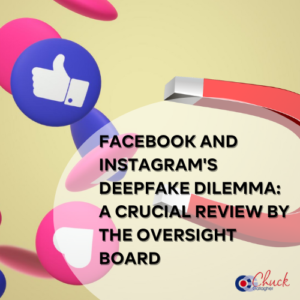 In an era where artificial intelligence (AI) reshapes the boundaries of content creation, a new challenge has emerged on social media platforms: deepfake pornography. This disturbing trend, which involves the creation of fake, explicit imagery using AI, is now under the microscope at Meta’s Oversight Board. The board has announced a pivotal review to scrutinize how Meta, the parent company of Facebook and Instagram, handles these invasive and harmful materials.
In an era where artificial intelligence (AI) reshapes the boundaries of content creation, a new challenge has emerged on social media platforms: deepfake pornography. This disturbing trend, which involves the creation of fake, explicit imagery using AI, is now under the microscope at Meta’s Oversight Board. The board has announced a pivotal review to scrutinize how Meta, the parent company of Facebook and Instagram, handles these invasive and harmful materials.
The concern is not unfounded. High-profile cases, such as AI-generated explicit images of female public figures from both the United States and India, have triggered this investigation. The board aims to determine if Meta’s existing policies are robust enough and whether they are being enforced uniformly across the globe.
Deepfake technology, which allows for the manipulation of video and image content to an eerily accurate degree, has become a tool for online harassment. This technology can create content that is not just fake but profoundly violating. Notable victims of this form of digital abuse include celebrities and everyday individuals alike, emphasizing the urgent need for compelling content moderation.
The Oversight Board, sometimes called Meta’s “Supreme Court,” is a body of experts dedicated to upholding the principles of freedom of expression and human rights within Meta’s platforms. This board allows users to appeal content decisions and advocates for a fair and balanced approach to content moderation.
In one of the cases under review, an AI-generated nude image resembling a public figure from India was posted on Instagram. Still, it was initially overlooked by the platform’s automated systems. Only after the Oversight Board intervened was the image removed for violating Meta’s bullying and harassment rules. Another instance involved a manipulated photo of a nude woman being groped, intended to resemble an American public figure, which had to be addressed repeatedly to adhere to the platform’s policies.
These incidents underscore a troubling disparity in how content is moderated across different regions and languages, suggesting that Meta may be more vigilant in some areas than others. The Oversight Board’s co-chair, Helle Thorning-Schmidt, highlighted this concern, stating the need to assess whether Meta’s efforts genuinely protect women globally.
As this review proceeds, the board is calling for public input on the impact of deepfake pornography and Meta’s response strategies. This open comment period, which concludes on April 30, is a crucial part of their comprehensive review process, aiming to gather a wide range of perspectives on this pressing issue.
This scrutiny comes as generative AI capabilities accelerate, making creating and distributing harmful content increasingly easy. The outcomes of this review could lead to significant changes in how social media giants like Facebook and Instagram manage such content, marking a critical step in the fight against digital abuse and harassment.
Chuck Gallagher is an AI speaker, Author, and Consultant.
References


